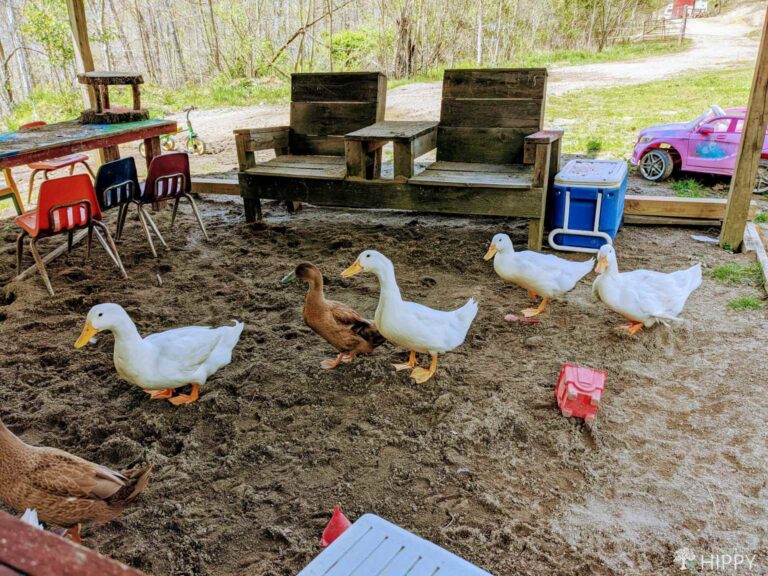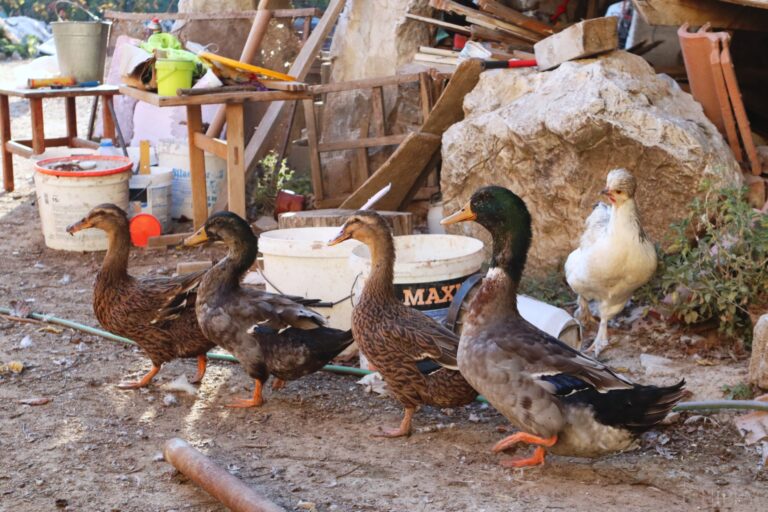Chickens might literally and figuratively rule the roost when it comes to poultry for homesteaders but there are other birds besides those.

Next to our trusty yard birds ducks are the most popular option. Similar in many respects, ducks are obviously aquatic and also more capable fliers than chickens.
This raises an obvious question: if you free-range your ducks will they fly away?
No, ducks will not usually fly away if you free-range them. Like domestic chickens, most domestic duck species are not great at flying, and even if they are, they generally prefer to stay where they know they have food, water, and shelter.
Ducks have a lot to commend them, and even more when you consider they aren’t as big a flight risk as you might think.
Ducks might be a great addition to your homestead or farm, but there is plenty you’ll need to know about them in the meantime. Keep reading to find out.
Should You Free-Range Ducks at All?
As with chickens, there are pros and cons to free-ranging your ducks.
On the one hand, ducks that are allowed to forage will be more active and healthy as they search for food.
This can help prevent obesity, which can lead to a number of health problems including heart disease, liver disease, and respiratory issues.
On the other hand, free-ranging ducks have a greater chance of coming into contact with predators or getting into trouble. They are also more likely to eat things they shouldn’t, which can lead to digestive issues.
In the end, though, the benefits usually far outweigh the risks unless you live in a place lousy with predators.
The varied diet, greater activity, and improvement in mood and sociability is a great things for ducks.
But ultimately, the decision of whether or not to free-range your ducks is up to you. If you do decide to let them out of their enclosure, be sure to take some steps to reduce what risks there are.
Aren’t Ducks Good at Flying?
Usually, yes. But not always! It really depends on the breed of duck.
This is partly because domestic ducks have also been bred to be larger than their wild waterfowl cousins, but it’s also because they generally don’t feel the need to fly away since they are well-fed and have everything they need where they are. But don’t get me wrong; there are actually some duck breeds that can’t fly at all.
Wild Ducks Fly Much Better than Domesticated Ducks
The most important thing to remember is that the majority of domestic duck breeds, like most domestic bird species in general, are not good fliers. This is in stark contrast to their wild kin, which are much better at flying.
The wild ancestors of our domestic ducks can fly long distances and reach high altitudes. They are also very good at taking-off and landing from the water, which is something many domesticated duck breeds struggle with.
This difference in flying ability is due to a number of factors, including diet, body size and shape, and musculature.
Some Domestic Species Can Barely Fly
When assessing some breeds, you’ll find that they are anything but a flight risk. Breeds like the Cayuga and the Rouen, are not able to fly at all, except perhaps short hops over very short distances.
They have been bred over time to be much larger than wild ducks, which has meant sacrificing their flying ability. That works to a keeper’s advantage in any case!
Other popular duck breeds, like the Muscovy and the Mallard, are better fliers but they still don’t fly as much as most wild ducks.
If you want to completely eliminate any worries about your ducks flying the coop, you can select a breed that is known to be ground-bound or a poor flier.

Even if Your Ducks Can Fly, They Will Rarely Leave Their Home
One thing that most potential owners don’t consider is that your ducks probably don’t want to leave where they are, assuming you are taking good care of them.
For us, it is difficult to imagine why we wouldn’t take off if we could fly, but think about it from the duck’s perspective.
At its current home it has everything it needs and wants. It does not necessarily have some romantic yearning for the open sky! Ducks fly to live, they don’t live to fly.
Ducks Prioritize Food, Water, Companionship, and Shelter
Following up on the previous point, if you make sure that all of a duck’s needs are met on a consistent basis it probably won’t even think to fly away (unless it is startled or chased by a predator).
This is because all ducks care about the same things: food, water, companionship, and shelter.
As long as your ducks have plenty of food, water and friends they will be content to stay right where they are.
Ducks, Like Most Birds, Have Excellent Homing Instincts
Let’s say that one of your flight-worthy ducks does get airborne and decides to fly away.
In all likelihood, it will not get very far before it realizes that it is no longer in its home territory. Even if it does, you probably don’t need to worry about it getting lost.
Ducks, like most birds, have a strong homing instinct that kicks in when they find themselves in unfamiliar surroundings.
This means that even if your duck does manage to fly away, there is a good chance it will come right back on its own accord.
Of course, this is not always the case, and there is no guarantee that your duck will come back if it flies away.
But if you take some basic precautions we’ve discussed, the chances of your ducks flying away are slim to none.
You Can Usually Free-Range Your Ducks Without Fear
Assuming you have taken the steps to ensure that your ducks can’t or don’t want to fly away, you will probably be able to free-range them without any problem.
This is the best way for ducks to live and thrive, as it allows them to express their natural behaviors and instincts.
Of course, there are always exceptions and there may be times when you need to confine your ducks for one reason or another.
But if you have done everything we’ve discussed so far, you shouldn’t have any major issues with your ducks taking wing.
If a Duck is Proving Too Flighty, Clip Their Wings
If you want to guarantee your ducks stay grounded no matter what you can choose to clip your ducks’ wings.
It isn’t as bad as the name suggests; you aren’t mutilating your ducks, and you aren’t going to permanently remove their flight capability (if they have it) or even hurt them,
This is a fairly straightforward process that involves trimming the flight feathers of the wing to prevent the duck from being able to get enough lift to take off.
Many people choose to do this because it means their ducks are far less likely to fly away in any conditions, but it does have some downsides.
For one thing, it can be stressful for the ducks since they need to be gently restrained during the process.
It can also make them more vulnerable to predators since they won’t be able to take off and escape if something comes for them.
Clipping a duck’s wings is a personal choice, and there is no right or wrong answer. It is something you will need to decide for yourself based on your individual priorities, but you should not hesitate if it is the right answer for you and your flock.
Keep Your Ducks Penned with a Cargo Net
Another option for keeping your ducks securely penned in place is simply stringing a cargo net or crisscrossed straps over their enclosure. Make sure it is high-visibility so your ducks can notice it.
They won’t try to fly through an obstacle like that, and you can rest easy knowing they won’t fly off, wings clipped or not.
This method is not foolproof, however. If your ducks are determined to take to the skies they may find a way out, or try to wriggle through gaps in the net.
But if you are careful about the way you set it up, this can be an effective method for keeping your ducks exactly where you want them.
Tom has built and remodeled homes, generated his own electricity, grown his own food and more, all in quest of remaining as independent of society as possible. Now he shares his experiences and hard-earned lessons with readers around the country.
Find out more about the team here.
